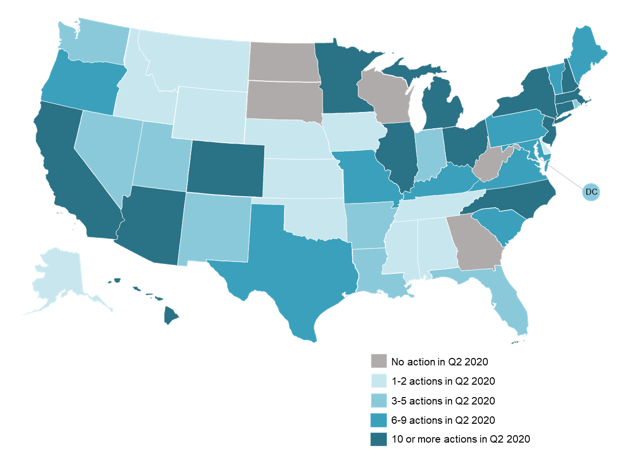The 50 States of Grid Modernization Q2 2020: Utilities Increasingly Developing Distributed and Customer-Centric Solutions
Raleigh, NC – (July 29, 2020) The N.C. Clean Energy Technology Center (NCCETC) released its Q2 2020 edition of The 50 States of Grid Modernization. The quarterly series provides insights on state regulatory and legislative discussions and actions on grid modernization, utility business model and rate reforms, energy storage, microgrids and demand response.
The report finds that 45 states, as well as the District of Columbia, took actions related to grid modernization during Q2 2020 (see figure below), with the greatest number of actions relating to energy storage deployment (46), data access policies (32), utility business model reforms (31), distribution system planning (28) and advanced metering infrastructure opt-out rules (25).
A total of 421 grid modernization actions were taken during Q2 2020. New York, California, Massachusetts, and Minnesota took the greatest number of actions during the quarter, followed by New Jersey, Michigan, Hawaii and Arizona.
Q2 2020 Legislative and Regulatory Action on Grid Modernization

The report discusses three trends in grid modernization actions taken in Q2 2020: (1) utilities increasingly proposing residential battery storage programs; (2) states undertaking efforts to improve electric grid resilience; and (3) utilities developing a growing number of critical peak pricing and peak time rebate programs.
“A growing number of utilities have been introducing programs that incentivize residential customers to install battery storage systems, with the aim of using these batteries to provide grid services,” noted David Sarkisian, Senior Policy Analyst at NCCETC. “These programs involve varying degrees of utility control, such as direct utility ownership, utility management of customer-owned systems, or customer-controlled systems with grid services encouraged through rates or incentives.”
The report notes the top five policy developments of Q2 2020 were:
- California regulators adopting Staff recommendations to accelerate the deployment of microgrids and resilience solutions;
- The Oregon Public Utility Commission approving a new residential storage incentive program for Portland General Electric;
- The Connecticut Public Utilities Regulatory Authority opening three additional grid modernization proceedings;
- The DC Public Service Commission approving grid modernization recommendations related to distributed energy resources, non-wires alternatives, and data access; and
- Kentucky Power Company filing a request for approval of AMI deployment and a new Grid Modernization Rider.
“Recently, we have been noticing greater utility attention to distributed energy solutions and customer-centric options,” observed Autumn Proudlove, lead author of the report and Senior Manager of Policy Research at NCCETC. “We are seeing more utilities propose residential-focused storage programs, as well as new customer rate options incorporating innovative elements like peak time rebates and critical peak pricing.”
View the 50 States of Grid Modernization Q2 2020 Executive Summary
View and Purchase the 50 States of Solar Q2 2020 update FULL Report
View other 50 States Reports – Solar, Grid Modernization and Electric Vehicles
ABOUT THE N.C. CLEAN ENERGY TECHNOLOGY CENTER
The N.C. Clean Energy Technology Center, as part of the College of Engineering at North Carolina State University, advances a sustainable energy economy by educating, demonstrating and providing support for clean energy technologies, practices and policies. It serves as a resource for innovative, sustainable energy technologies through technology demonstration, technical assistance, outreach and training. For more information about the Center, visit: http://www.nccleantech.
Media Contact: Shannon Helm, NCCETC, shannon_helm@ncsu.edu